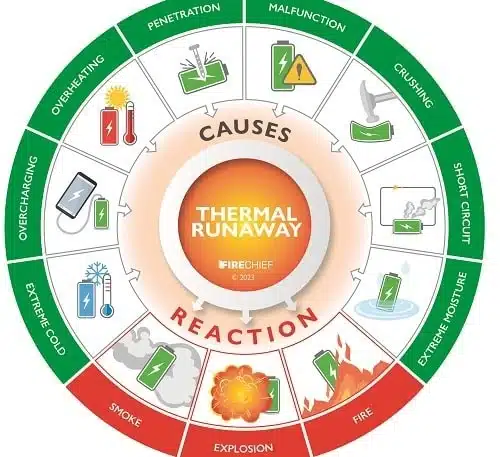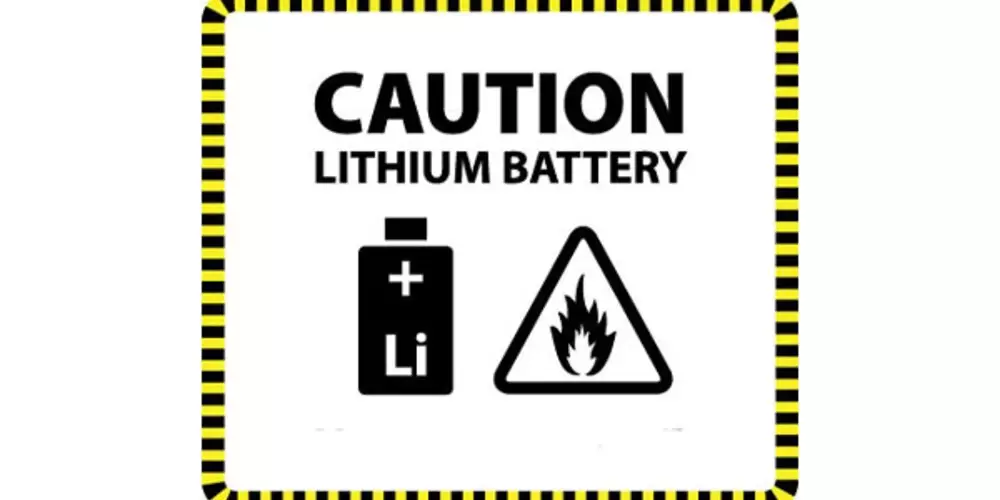The lithium-ion batteries and lithium-polymer batteries we commonly use have the characteristics of high energy density, small size, and sufficient power. They are generally equipped with protection mechanisms, protection boards or battery management systems. It can prevent some extreme situations, because these protections are not omnipotent.
This article explores the potential risks of lithium batteries, how to use them safely, identifying danger signs, emergency response and other comprehensive information.
Table of Contents
TogglePotential risks and causes of lithium batteries
The possible risks of lithium batteries include overheating, fire, explosion, bulging, and leakage, which are all real concerns. We briefly analyze the reasons for them one by one.

Overcharging and over-discharging are caused by bad charging habits of lithium batteries.
Physical damage, such as if the device was dropped and the battery was crushed or punctured.
Short circuit, whether due to internal or external reasons, may cause the positive and negative poles to be short-circuited.
High temperature environment, place in the car or expose to the sun in summer.
Using poor quality or incompatible charger.
There is a possibility that the battery itself is aged or has a manufacturing defect.
Core principles for safe use of lithium batteries
Safe charging is an important part of lithium batteries. You must use original or certified chargers and stay away from inferior or mismatched chargers. Avoid charging overnight or leaving it unattended, and avoid overcharging for a long time. Do not charge at extreme temperatures (high or low).
During use or transportation, avoid physical damage, falling, squeezing, bending, etc. If abnormal temperature is found, stop using it immediately. Try to handle it with care.
When the device or spare battery is not in use, it is recommended that you store it in a cool and dry environment. Keeping the voltage at 40% to 60% for long-term storage is good for battery health and safety. It is better if the spare battery can be additionally protected, such as in a fireproof bag, and avoid mixing with metal.
Identify danger signals and handle emergencies

There are some warning signs you can spot before lithium battery danger becomes a serious problem. Here are some typical danger signs.
The battery begins to swell and deform, which is the most obvious change in appearance.
The device or battery starts to get abnormally hot.
Smelling chemicals or a burning smell is a sign that a chemical reaction may be occurring inside the battery.
Liquid is seen leaking from the battery or device.
Battery life is significantly shorter.
If you encounter the above phenomenon, stop using or charging it immediately, and then move it to a safe, open place without flammable materials nearby for observation. When dealing with emergencies, personal safety is the first principle.
If it is a very small fire, try using a specific type of fire extinguisher (Class D) or cover it with plenty of sand.
If the fire is large or you cannot control it, please evacuate to a safe area immediately and call the fire department immediately.
Responsible disposal & purchase advice
Many people simply throw used batteries or old devices into the trash, but this is a very wrong and potentially dangerous practice.
The metals and electrolytes inside lithium batteries can pollute the environment and, if damaged or short-circuited, pose a risk of fire during waste disposal.
Look for professional recycling points nearby and pay attention to battery recycling bins or recycling services set up by official agencies.
Before recycling, it is best to tape the positive and negative poles of the battery (electrode insulation) to prevent accidental short circuit during transportation or storage.
Please do not buy cheap products that are too cheap or of unknown origin. Please choose a battery factory with a big brand or a battery that has passed UL, CB and other certifications. This will help you reduce the risk from the source when purchasing batteries or equipment containing batteries. Hongyitai is a factory specializing in the production of lithium batteries, producing a variety of lithium-ion batteries.
Conclusion
The key to lithium battery safety lies in daily prevention and correct use. We encourage all users to apply the above theories to practical life.
